
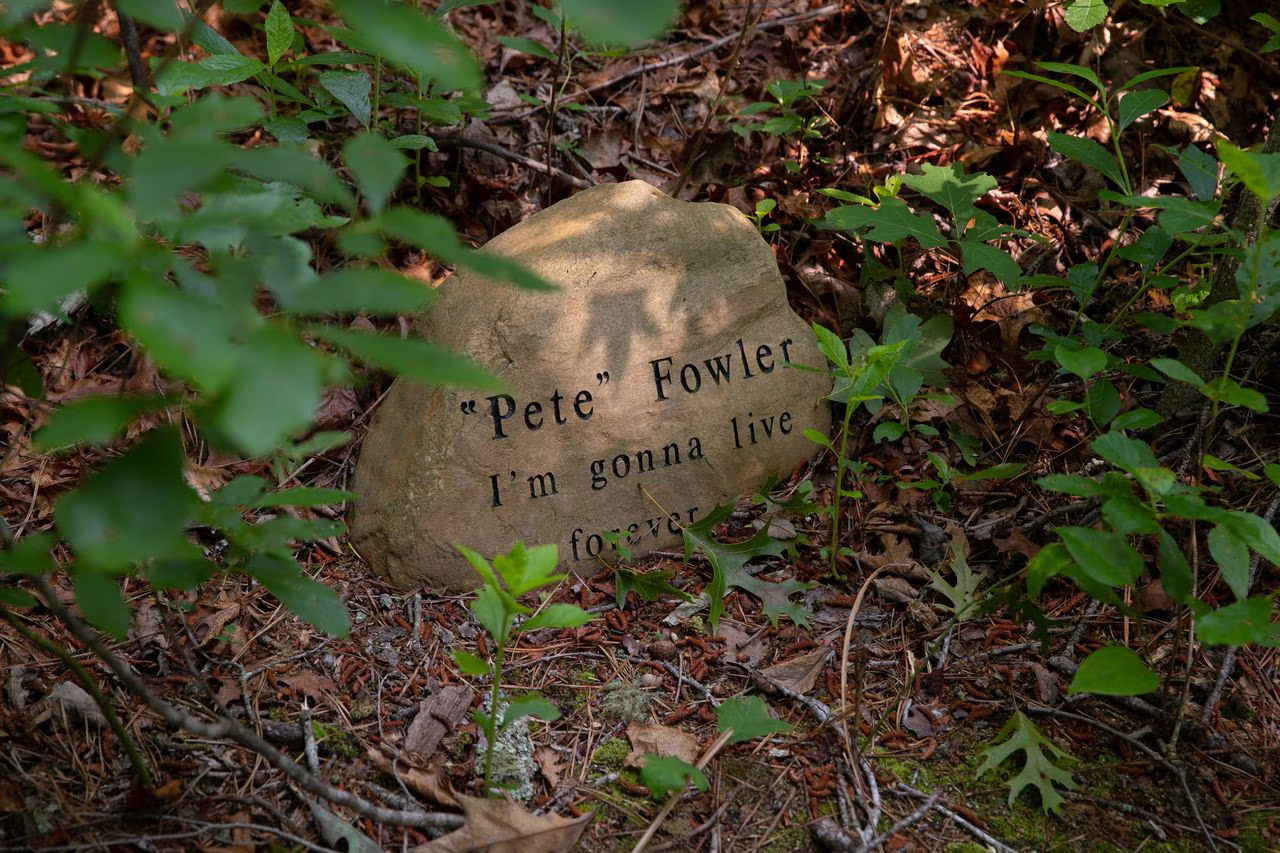
A grave stone reads, ‘I’m gonna live forever,’ at the Steelmantown Cemetery, a natural burial ground in Upper Township, Cape May County with walking trails and a wildflower meadow. (Dave Hernandez | For NJ Advance Media)
By Jackie Roman | NJ Advance Media for NJ.com
This story was produced in collaboration with CivicStory as part of the New Jersey Sustainability Reporting project.
Along a winding, bright green moss trail in Steelmantown Cemetery is a small engraved rock surrounded by 100-year-old pine trees that reads: “I’m gonna live forever.”
The marker in Cape May County is the final resting place for one of the growing number of New Jerseyans and their families choosing to have their funerals in “natural burial grounds” — cemeteries where remains are placed directly in the ground with no embalming fluids, caskets or burial vaults.
As interest in environmentally-friendly burials increases, more people are swapping their marble headstones for reclaimed rocks and their metal caskets for wicker boxes. For many, it is a way of practicing sustainability even after their deaths, according to local funeral directors.
The practice — known as green or eco-friendly burials — has been catching on in New Jersey as people look for ways to reduce their environmental impact even long after their lives have ended.
“People that have lived their lives environmentally sensitive on the Earth, people that have embraced a healthier lifestyle and embraced recycling and being aware of what goes in your garden, they realize there’s no reason to have a funeral outside of their lifestyle,” said Robert Prout, co-owner of Prout Funeral Home in Verona.
“And that’s where natural burial comes in,” said Prout, a nationally recognized speaker on integrating greener practices into the funeral business.
Some of the green burial options are controversial. Human composting — a process in which human remains are heated with wood chips and natural materials and turned into soil — is only legal in seven states. Legislation was recently proposed to bring it to New Jersey.
Another new funeral option, known as alkaline hydrolysis or water cremation, uses a water-based dissolution process to speed human decomposition. It is legal in 20 other states, but not New Jersey.
READ MORE: Human composting — turning dead bodies into soil — could become legal in N.J.
But, not everyone is supportive of the new funeral options that emphasize sustainability.
The U.S. Catholic bishops said neither human composting nor water cremation “show adequate respect for the human body, nor express hope in the resurrection.”
A traditional burial is “the most fitting way to express faith and hope in the resurrection of the body,” the bishops said.
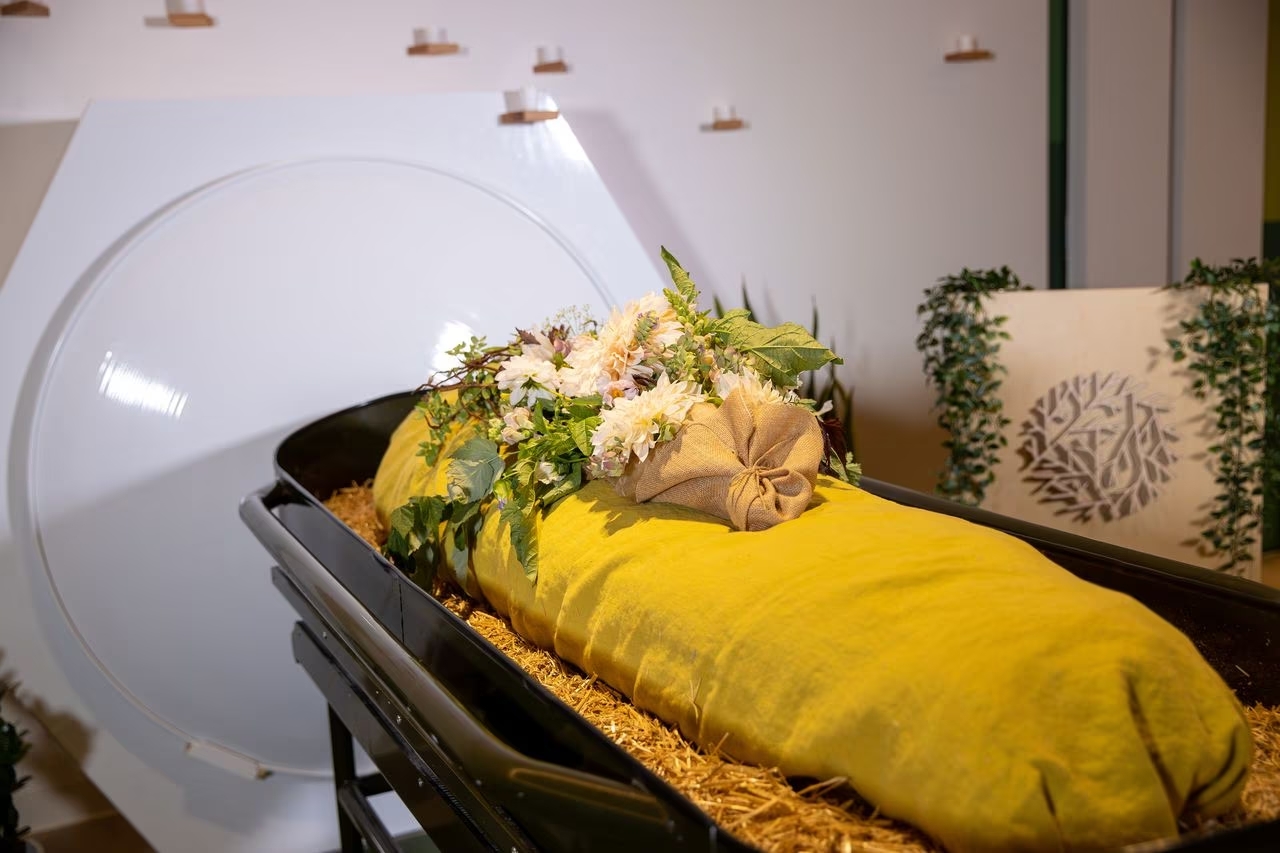
A shrouded mannequin covered with flowers rests near a composting vessel at Recompose, a company in Seattle, Washington, that uses human composting. Legislation has been introduced that would make New Jersey one of the states where human composting is legal. Getty Images for Recompose
Not all funeral homes or funeral directors offer eco-friendly burials or work with natural cemeteries. But, supporters say the the demand for new, sustainable burial options will only grow as people become aware of the options.
Green burial is a way of caring for the dead with minimal environmental impact, advocates say. It also aids in the conservation of natural resources, reduction of carbon emissions and the preservation of habitats.
A conventional burial often involves chemical embalming, treated wood or metal caskets, metal or concrete vaults, and a host of other manmade materials.
Each year, U.S. cemeteries bury caskets containing over 30 million feet of hardwood and 90,000 tons of steel. They also use 17,000 tons of steel and copper and 1.6 million tons of reinforced concrete in burial vaults, according to research published by National Geographic.
But, a green or natural burial means no embalming, no liners or vaults, no headstones, and using only biodegradable containers, whether that be caskets, cloth shrouds or nothing at all, according to the Green Burial Council, an international nonprofit that advocates for natural death care.
Funeral care professionals say a green burial can be simple and intimate. Loved ones are encouraged to be involved with the services. The family is often able to join in the ritual washing of the deceased. During the burial, family may help lower their loved one into the ground at the cemetery.
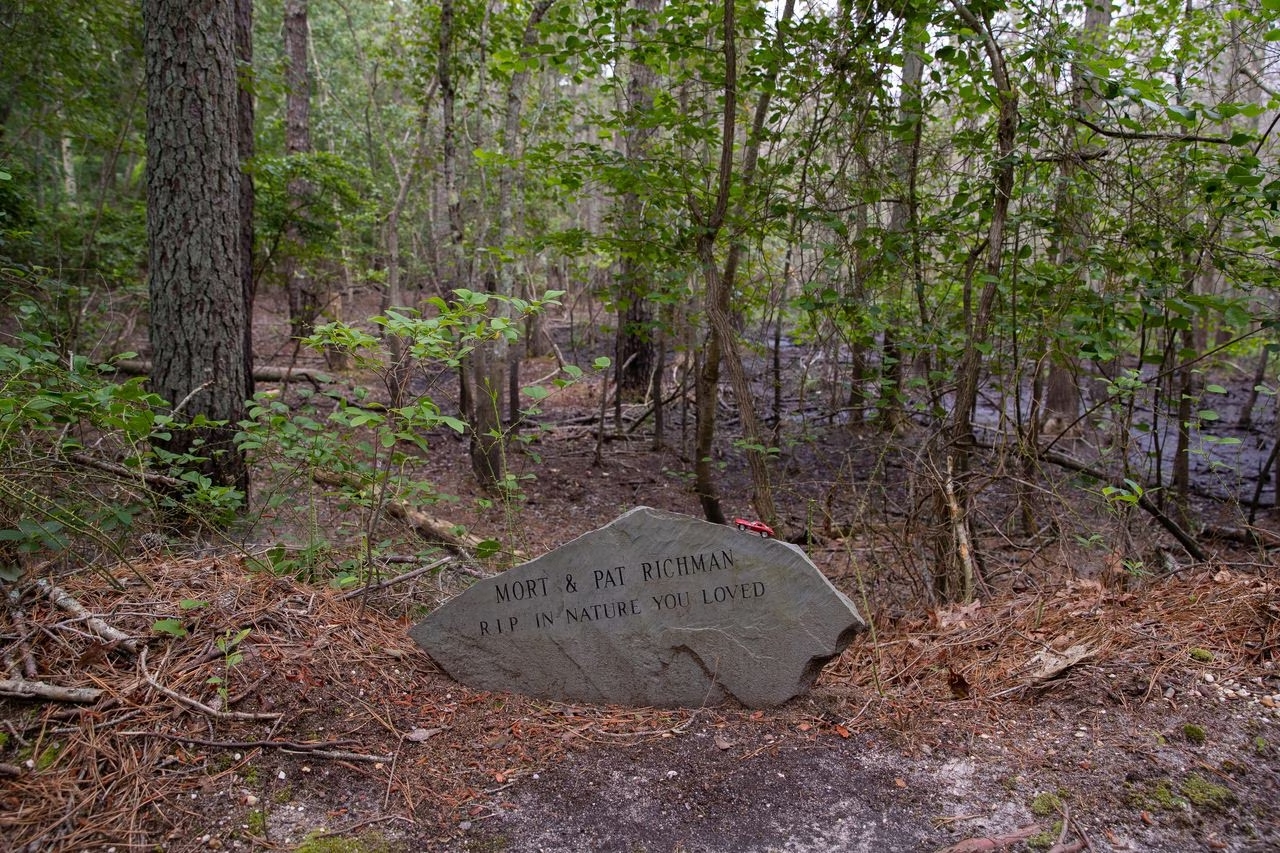
Green burial means no embalming, no liners or vaults, no headstone, and no metal caskets. Here, an old rock is used as a a grave marker at the Steelmantown Cemetery, a natural burial ground in Cape May County. (Dave Hernandez | For NJ Advance Media)
“Natural burial allows your family to become a little bit more actively involved with the care of the deceased, as opposed to being a spectator in the front row of a church. It allows the family the opportunity, if they wish, to become involved with either washing and shrouding,” said Prout.
Prout Funeral Home in Essex County is one of the 10 funeral homes in New Jersey certified with the Green Burial Council. Green certified funeral homes “demonstrate compliance with established Green Burial Council standards, designed to create sustainable practices in the funeral industry, and to preserve and steward land through burial,” according to the nonprofit council’s website.
Green certified funeral homes are trained to work with a family to create an embalming-free, eco-friendly service and burial. But, funeral homes do not have to be green certified to provide the option, funeral directors said. Any willing funeral director can assist a family in carrying out their wishes for a green or natural burial.
“Our involvement in conservation efforts is simply a reflection of what we personally feel. Some people golf and some people like playing bocce or do woodworking or quilting. Well, we’re involved in conservation efforts. Having natural burials is just reflective of who we are and what we do and what we believe,” said Prout, whose funeral home runs almost entirely on solar power.
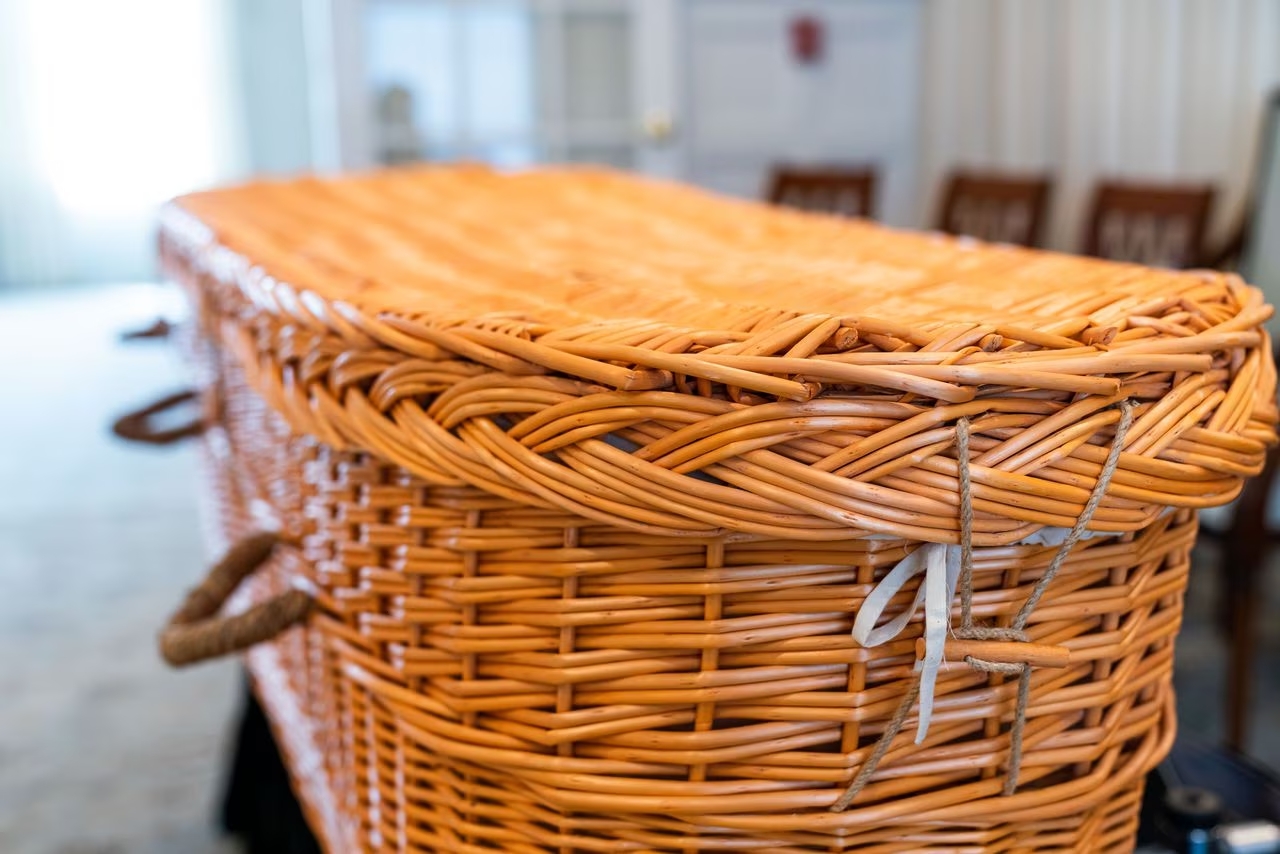
A biodegradable wicker casket is one of the options shown at the Madison Memorial Home in Madison, New Jersey, on Wednesday, June 28, 2023. Chris Krusberg | For NJ Advance Media
While green burial might sound new age, it has actually been around for centuries, advocates say. Before the mid-19th century, when embalming was adopted as the standard, most burials would have been considered green or natural burials. Many Muslim and Jewish burials are still green burials because the deceased is typically buried about 24 hours after death in coffins made out of wood and without embalming.
At Madison Memorial Home in Morris County, more people have been requesting green burial options, the owner said.
“Green burial and more environmentally friendly methods of disposition are becoming more and more popular, especially in this area,” said Douglas Loikith, owner and manager of Madison Memorial Home in Madison.
After increased requests for environmentally friendly burials, Loikith began offering catalogues dedicated to the green burial options available. The booklet includes photos of mannequins wrapped in fabric shrouds made of biodegradable materials, including 100% organic cotton, hemp, wool or bamboo.
Shrouds can be paired with a container made from sustainable, untreated, biodegradable materials, including pine, bamboo, willow or seagrass. Madison Memorial has a pine wooden casket and a woven willow casket on display at the funeral home, so people can see some of the options for themselves.
Those opting for cremation also have eco-friendly choices. Urns to hold cremated remains can be made of organic materials, including corn starch, salt or untreated wood. The catalogue at Madison Memorial Homes shows pictures of elaborate urns made from pink Himalayan rock salt, gelatin and paper mache. These can be placed in the water to degrade slowly over time or be buried.
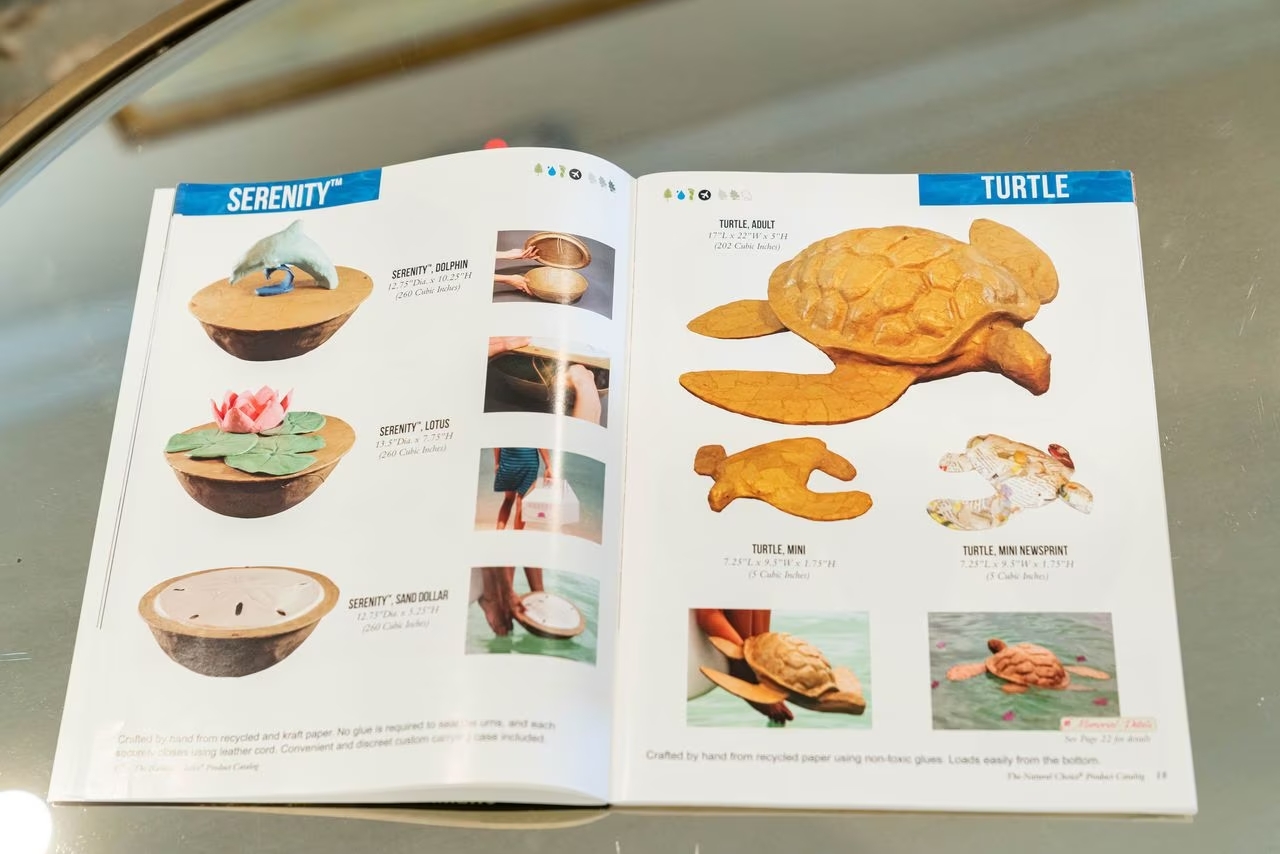
Madison Memorial Home offers a catalog with eco-friendly options for cremated remains, including biodegradable urns made of paper mache, gelatin and salt that dissolve in water or decay underground. Chris Krusberg | For NJ Advance Media
“There are so many options that a lot of the general public does not know about, they’re not aware of these things,” said Funeral Director Victoria K. Waumans. “So, it’s nice to be able to let people know that you’re not limited to a traditional service and burial or cremation. You can also do something like this if that appeals more to your sensibilities.”
Generally, green or natural burial is more affordable than conventional burial. A simple wooden casket will usually cost somewhere from $800 to $1,000, Loikith estimated. A more elaborate willow woven container, for example, would cost approximately $2,400, he said.
By comparison, an average metal casket costs slightly more than $2,000, and some mahogany, bronze or copper caskets sell for as much as $10,000, according to the Federal Trade Commission.
Nationally, the average cost of a funeral with casket and below-ground burial was $7,848 in 2021, while the median cost of a funeral with cremation was approximately $6,971, according to the National Funeral Directors Association.
The cost of a green funeral varies depending on the method, materials, and green burial cemetery chosen. Services can run from anywhere under $1,000 to over $20,000, according to industry estimates.
But, New Jersey funeral directors and cemetery owners said a green burial is generally less expensive than a traditional funeral with all the bells and whistles. At Steelmantown Cemetery, the natural burial ground in Cape May County, the total cost of a green burial funeral service runs between $7,000 to $10,000, cemetery officials said.
When it comes to profit, green burial may not be the best business for funeral directors, Loikith said.
“But you have to remember there’s people that value this and it’s going to be a lot less than a traditional funeral, but you have to accommodate it,” said Loikith. “It’s like when cremation started to become very prevalent 30 years ago. A direct cremation is a lot less than a funeral and the funeral directors were starting to panic, but this is the world we live in and you have to be flexible.”
“You have to accommodate and be professional to take care of everybody, because no one’s right or wrong,” Loikith added.
For those seeking a natural burial location, funeral directors said there are three green or hybrid cemeteries in New Jersey: Rosemont Cemetery in Delaware Township in Hunterdon County; Maryrest Cemetery in Mahwah in Bergen County; and Steelmantown Cemetery in Upper Township in Cape May County.
However, families do not have to work with a green certified funeral home in order to be buried at a green cemetery. Most cemeteries will work with any willing funeral home to accommodate a client’s wishes and vice versa.
Following requests from Catholics seeking a green burial option, Catholic Cemeteries of the Archdiocese of Newark dedicated a two-acre site at Maryrest Cemetery and Mausoleum in Mahwah in 2010 as a natural or green resting place.
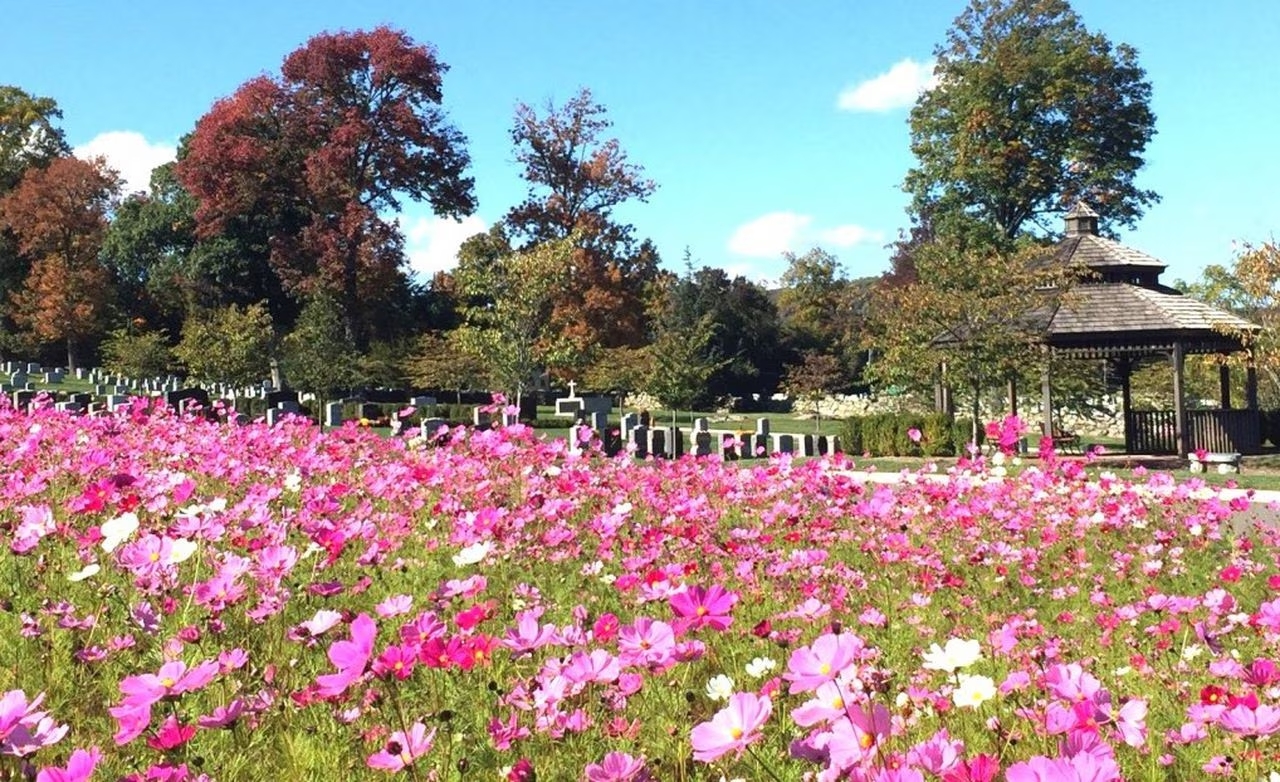
The natural burial section at Maryrest Cemetery and Mausoleum in Mahwah has no manufactured headstones, unlike the rest of the cemetery. (Courtesy of Catholic Cemeteries)
For Catholics, natural burial can be “a spiritually-fulfilling option to traditional interment or cremation,” said Maxim Almenas, spokesperson for Catholic Cemeteries of the Archdiocese of Newark.
“It seems that natural burial is an ideal way to honor our Catholic faith in the Resurrection and the cycle of death and rebirth. In choosing this option, we are committing our bodies to the Earth in the purest way, free of preservatives, metal or concrete,” Almenas said.
“Not only is it a return to burial traditions of the past, but it also may be a statement of personal values for those who wish to minimize their impact or ‘carbon footprint’ on the environment,” Almenas said.
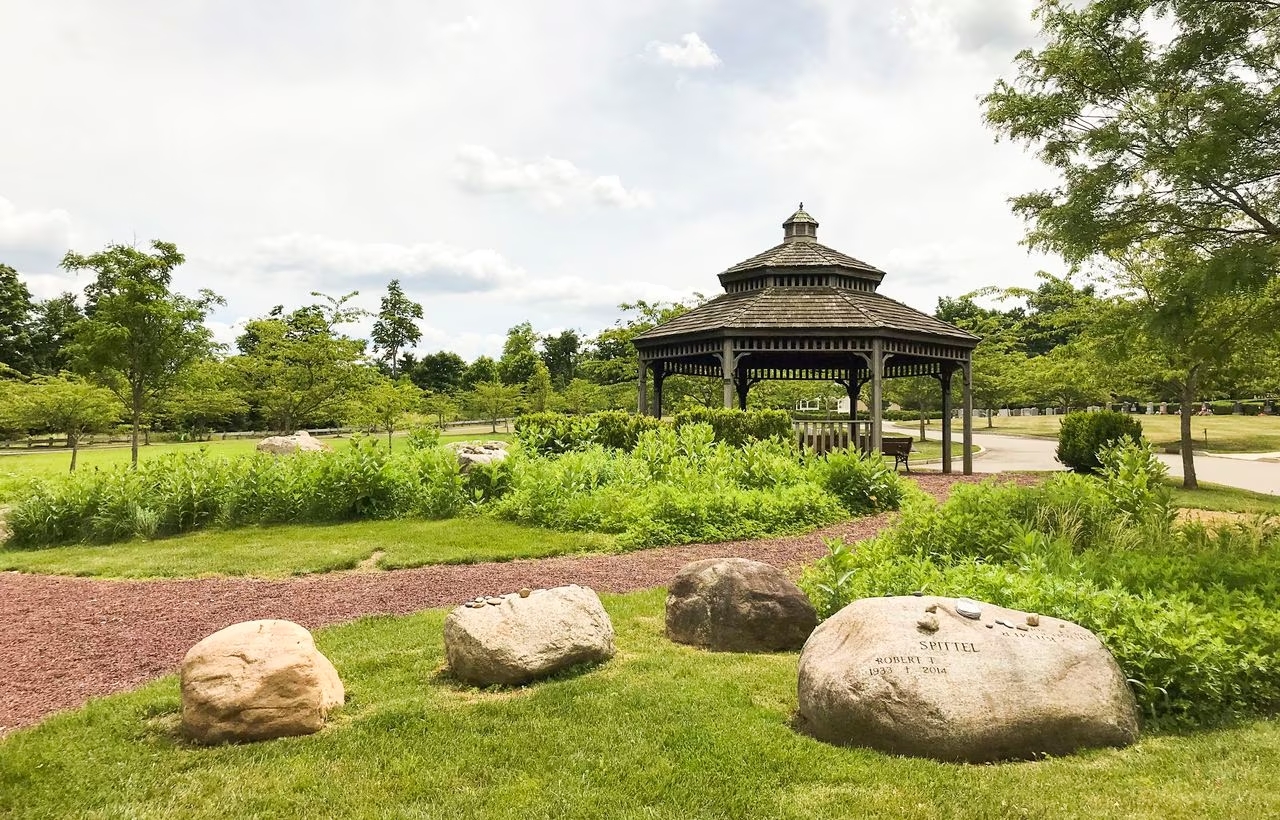
Part of the natural burial section at Maryrest Cemetery and Mausoleum in Mahwah. There are no manufactured headstones, metal caskets, vaults or liners in this section. (Courtesy of Catholic Cemeteries)
The natural burial section at Maryrest has been developed to accommodate three types of green burial options: dark green, for those who prefer to be buried in a burial shroud; medium green, for a natural biodegradable casket with memorialization; and light green, for a natural biodegradable casket, memorialization, and embalming using natural embalming fluids.
There are no manufactured headstones, burial containers, vaults, or decorations in the natural burial section. But, there is a collection of trees, shrubs, and native grasses and plants. There’s also a gazebo for visiting family.
The cemetery averages one burial per month in its natural burial section, Almenas said.
Because a natural burial has to take place quickly due to the lack of embalming, there isn’t a traditional viewing. Instead, “people will come to the gravesite and honor the individual there,” said Lisa Aron, secretary at Rosemont Cemetery, a non-denominational burial ground in Hunterdon County that unveiled a memorial garden and natural burial area in 2017.
“They can be involved in lowering. They can help put dirt into the grave. I think the idea of a green burial really says a lot about the person too, that they cared enough about the Earth. It doesn’t linger on death, it’s more a celebration of their life and how they live versus their death,” said Aron, who helps coordinate burials at the cemetery.
The option has been popular at Rosemont Cemetery, with green burial sales surpassing new traditional sales, Aron said.
While natural burials are becoming more popular, some loved ones have raised concerns about the process. Some of the questions about green burials include the health ramifications of burying remains directly in the soil without a vault and the risk of remains being dug up.
Studies have found “a relatively low impact of cemeteries on groundwater pollution by bacteria and viruses,” according to a 2015 World Health Organization review of research.
A 2022 study published in Chemosphere, an international journal on chemicals in the environment, looked at the environmental pollution caused by cemeteries and cremation. The study concluded “green burial should be an alternative, since the corpse does not go through the embalming process, thus eliminating the presence of any undesired chemicals, that are further leached into the environment.”
Cemetery staff at New Jersey’s green and hybrid burial grounds said there’s no risk of animals digging up the bodies either because remains are buried at standard depths ranging from 4 to 6 feet down depending on the location.
Throughout the funeral industry, interest in green burial options is up. According to National Funeral Director’s Association 2023 Consumer Awareness and Preferences Report, 60% of respondents would be interested in exploring “green” funeral options because of their potential environmental benefits, cost savings or for some other reason. That is up from nearly 56% in 2021.
“This is an environmental movement, but it’s more about the family. It’s about giving back the process to the family because it’s cathartic and healing,” said Ed Bixby, owner of Steelmantown Cemetery and former president of the Green Burial Council, an international nonprofit that advocates for natural death care.
“This is helping them get past the loss of a loved one. Instead of saying, ‘I lost them,’ they’re celebrating a life that was lived,” he added.
Established in the 1700s, Steelmantown Cemetery offers burials on an undeveloped, Revolutionary War-era property surrounded by the Belleplain State Forest. At the natural burial ground, people can be buried in a wildflower meadow or along a mile-long nature trail that runs through the property.
The cemetery also offers a “tree of life” cremation burial which involves planting a tree in honor of loved ones as a way of giving back to the environment.
All the burial plots at Steelmantown Cemetery sell for $3,000, plus a $1,500 fee when they are used for a funeral. The tree of life burials cost $1,500. Because there are no headstones, customers receive a map that shows the exact location of their plot.
“When I found natural burial, I thought, ‘Well, geez, maybe we can offer burial out among the trees,’” said Bixby. “I liked the idea that you could be laid to rest in this way. In an environment that felt really good, that felt different. It felt alive. It didn’t feel like this whole grief stricken place, but this very happy, light filled place.”
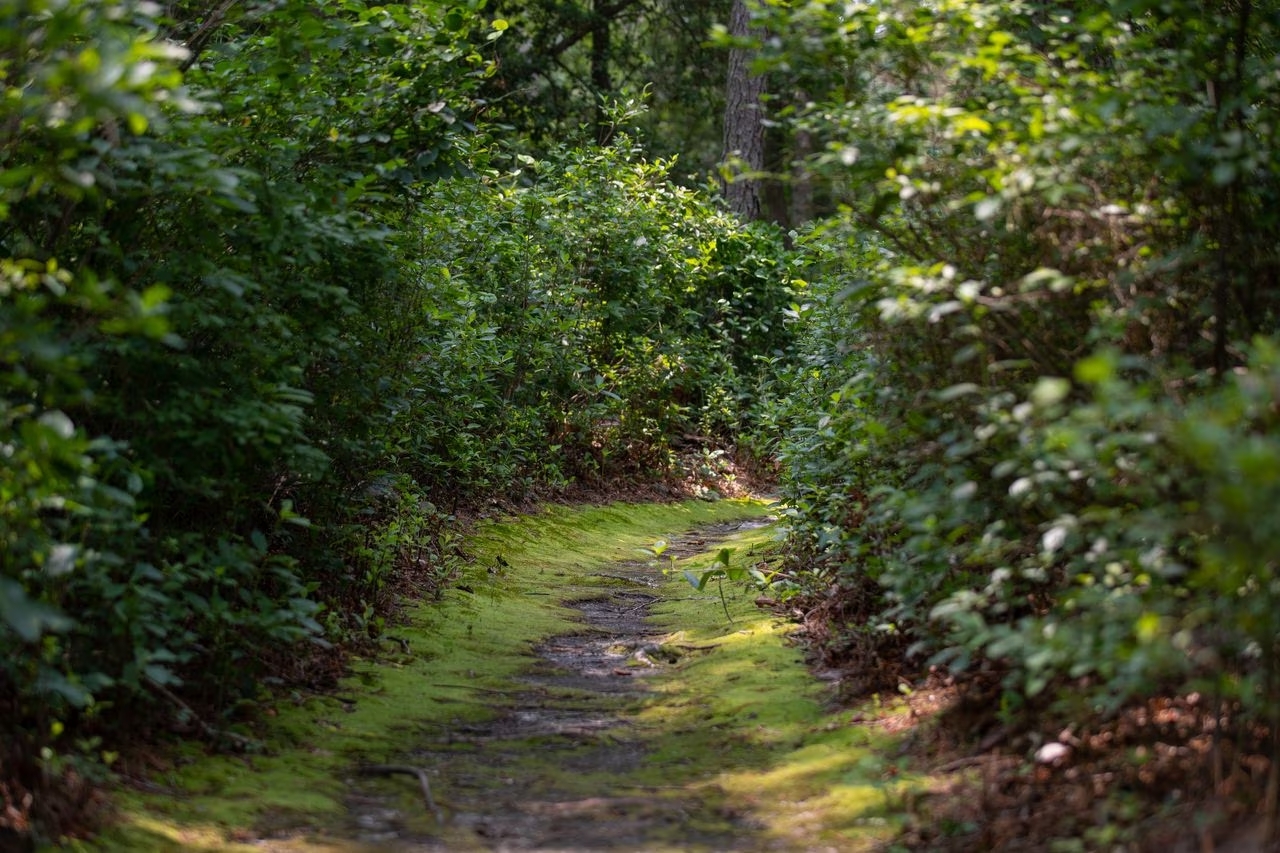
At Steelmantown Cemetery, a natural burial ground, people can be buried in a wildflower meadow or along a mile-long nature trail that runs through the property. (Dave Hernandez | For NJ Advance Media)
There may be even more burial options coming to New Jersey as people continue to seek new, sustainable approaches to funeral care.
Human composting has been legalized in seven states — California, Colorado, Nevada, New York, Oregon, Vermont and Washington. The practice could be coming to the Garden State under new legislation introduced by Sen. Joe Vitale (D-Middlesex) in February.
Human composting, or natural organic reduction, is a process that transforms the human body into soil. It typically involves placing bodies in a container and covering them with wood chips and straw, then heating the container for sustained lengths of time as the body breaks down. The entire process usually takes about two to three months and allows the human remains to be used in house plants, gardens or spread in forests.
Aquamation, known as alkaline hydrolysis or water cremation, is another alternative practice gaining popularity. The process is described by the Cremation Association of North America as “a water-based dissolution process for human remains that uses alkaline chemicals, heat, and sometimes agitation and/or pressure, to accelerate natural decomposition.”
As a result, it avoids releasing chemical compounds and carbon emissions into the air, which lowers greenhouse gases, advocates say. While aquamation is not legal in New Jersey, it is permitted in more than 20 other states, according to the Cremation Association of North America.
Funeral directors and cemetery owners say funeral choices all come down to personal preference.
“There’s something for everybody,” said Bob Fertig, owner of Fertig Funeral Home in Mullica Hill and best practices coordinator for the Global Green Burial Alliance. “There’s nothing wrong with what we see as traditional funerals. But, for the people that select green burial, whether it be for environmental reasons or just because they want to be out in nature, there’s something special about it.”
“It’s a beautiful thing,” Fertig said.
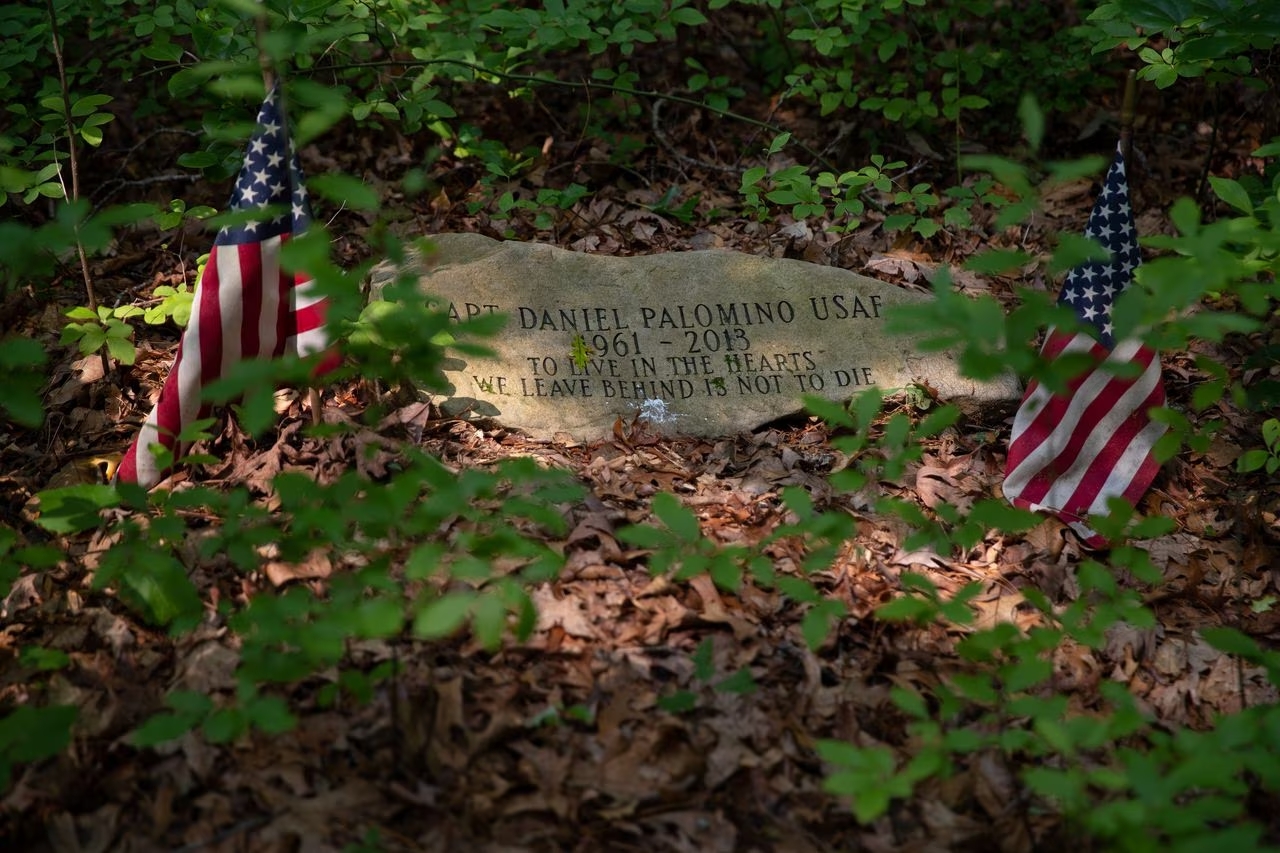
An Air Force Veteran’s grave at the Steelmantown Cemetery, a natural burial ground in Upper Township, Cape May County. (Dave Hernandez | For NJ Advance Media)
This story was produced in collaboration with CivicStory as part of the New Jersey Sustainability Reporting project.